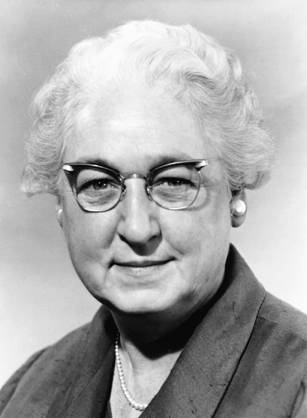Dr. Virginia Apgar
By Annabelle Sebastian
Virginia Apgar (1909-1974) was a physician and anaesthesiologist who developed the Newborn Scoring System, also known as the Apgar System. This system, which allows doctors to easily assess newborns’ physical health immediately after birth, has become a worldwide practice.
In 1925, Apgar began attending Mount Holyoke College, where she majored in zoology, and minored in chemistry, ultimately receiving her A.B. in 1929. In 1933, Apgar graduated from the College of Physicians and Surgeons at Columbia University with her M.D., after which she became the fifth woman to intern at the Columbia Presbyterian Medical Center. After two years, with a recommendation from the chairman of the Columbia Presbyterian Medical Center, Apgar enrolled in a nurse-anesthetist program at Columbia. Later, she attended instruction at the University of Wisconsin and Bellevue Hospital in New York City.
Apgar became the first woman to lead a department at the Columbia Presbyterian Medical Center in 1938, where she served as the director of the anesthesiology division. In 1949, she became the first professor of anesthesiology, and the first woman to hold full professorship at Columbia.
In 1952, Apgar developed the Apgar Scoring System, which rated newborns on a scale of 0-2 in heart rate, respiration, muscle tone, reflexes, and color, one and five minutes after birth.
After years of working in the delivery room, Apgar earned her master’s degree in public health from John Hopkins University in 1959. Upon earning her degree, Apgar was asked by the March of Dimes, a nonprofit organization focused on the prevention of maternal and baby health risks and deaths, to lead their Division of Congenital Malformations, where she campaigned to bring awareness towards the cause.
Apgar held various other positions, and made many other accomplishments over the course of her life, from lecturer at Cornell University and John Hopkins University, to receiving the Gold Medal for Distinguished Achievement in Medicine from the Alumni Association of Columbia College of Physicians and Surgeons, Woman of the Year in Science and Research by the Ladies’ Home Journal, amd the Ralph M. Waters Award of the American Society of Anaesthesiologists.
—
References:
Apel, Melanie Ann. 2004. Virginia Apgar: innovative female physician and inventor of the Apgar score. New York, NY: The Rosen Pub. Group. http://www.worldcat.org/oclc/50079596
Apgar, Virginia, Silvio Aladjem, and Audrey K. Brown. 1974. Clinical perinatology: [to the memory of Virginia Apgar]. Saint Louis: Mosby. http://www.worldcat.org/oclc/488369209
Burstyn, Joan N. 1990. “Virginia Apgar”. Past and Promise, Lives of New Jersey Women http://www.worldcat.org/oclc/54486281
James, L.S., “Fond Memories of Virginia Apgar.” Pediatrics 55, no. 1 (1975): 1-4
Pearce, J.M.S. “Virginia Apgar (1909-1974): Neurological Evaluation of the Newborn Infant.” European Neurology 54, no. 3 (2005): 132-134
Suggested Citation:
Sebastian, Annabelle. “Virginia Apgar.” New Jersey Women’s History, Rowan University Libraries, 2024. https://njwomenshistory.org/biographies/virginia-apgar/.
,Questions to Explore
Describe Dr. Apgar’s system for evaluating the medical condition of infants.
How has the Apgar System influenced additional evaluation processes in medicine?
What challenges did Dr. Apgar experience in her medical career, and how did these challenges influence her work?
How did Dr. Apgar’s early life influence her decision to enter the medical field?
Why were Dr. Apgar’s contributions innovative?
Additional Resources
Apgar, Virginia. Down’s Syndrome (mongolism). New York: New York Academy of Sciences, 1970. (Login Required: Link to Resource at Rowan University Libraries)
Butterfield, Perry M. “Foundations of Pediatrics. Virginia Apgar (1909-1974).” Advances in Pediatrics 59, no. 1 (2012)
(Login Required: Link to Resource at Rowan University Libraries)
Calmes, S.H. “Dr Virginia Apgar and the Apgar Score: How the Apgar Score Came to Be.” Obstetric Anesthesia Digest 36, no. 1 (2016): 14–15.
(Login Required: Link to Resource at Rowan University Libraries)
Chung, King-Thom. Women Pioneers of Medical Research : Biographies of 25 Outstanding Scientists. Jefferson, North Carolina; McFarland & Company, 2010.
(Login Required: Link to Resource at Rowan University Libraries)
Oliveira, Degrandi. Rogério, Carlos. “The Legacy of Virginia Apgar.” British Journal of Anaesthesia 124, no. 3 (2020): e185–e186.
(Login Required: Link to Resource at Rowan University Libraries)

